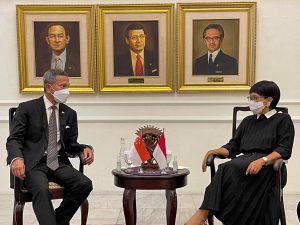Singapore has added its voice to a regional call for an emergency summit of the Association of Southeast Asian Nations (ASEAN) leaders to discuss the ongoing political crisis in Myanmar.
Singaporean Foreign Minister Vivian Balakrishnan made the call at the tail end of a three-nation diplomatic tour of Southeast Asia in Jakarta on Thursday, where he met with his Indonesian counterpart Retno Marsudi and discussed the increasingly febrile situation inside the country.
Since the Myanmar military’s seizure of power on February 1, security forces have killed at least 320 people, according to the Assistance Association for Political Prisoners. In addition, nearly 3,000 people have been arrested, charged, or sentenced for taking part in anti-coup protests, which have brought the country to a tense standstill and most economic activity to a halt.
Balakrishnan told a press conference that Singapore and Indonesia were “very distressed” by the situation in Myanmar and said he supported convening a special ASEAN leaders’ meeting so that the bloc could formulate a common position on the country’s troubles.
“Both Indonesia and Singapore believe there should be no foreign interference. But ASEAN stands ready to help in any way that we can help,” Balakrishnan said, adding that he relayed a similar message during previous stops in Brunei and Malaysia. “Therefore, we also support our leaders getting together to generate a common position in which ASEAN can express its support for Myanmar.”
Singapore’s call comes after Indonesian President Joko “Jokowi” Widodo and Malaysian Prime Minister Muhyiddin Yassin issued a similar call for ASEAN to convene a special summit in order to address the turmoil in Myanmar. Jokowi urged “that the use of violence in Myanmar be stopped immediately so that there are no more victims.”
Muhyiddin put out a more strongly worded statement, describing the situation in Myanmar as “deplorable.” “We in Malaysia and the larger ASEAN community cannot afford to see our brotherly nation of Myanmar become so destabilized at the hands of a selected few, who seek to promote their own vested interests,” Muhyiddin said.
As I mentioned apropos of that earlier call, it reflects an awareness of at least some members of ASEAN that the crisis in Myanmar has put the bloc’s international credibility and centrality on the line. It has also been accompanied by broader calls for a diplomatic summit aimed at restoring the crisis.
United Nations Secretary General Antonio Guterres has called for a “firm, unified international response” to the intensifying repression in Myanmar, and Thomas Andrews, U.N. Special Rapporteur on the situation of human rights in the country, said in a statement yesterday that a diplomatic summit should be held, which brings together ASEAN, the European Union, the United States, and China, alongside with representatives from the junta and the ousted civilian government.
“Without a focused, diplomatic solution, including the hosting of an emergency summit that brings together Myanmar’s neighbors and those countries with great influence in the region,” he said, “I fear the situation of human rights in Myanmar will further deteriorate as the junta increases the rate of murders, enforced disappearances, and torture.”
The growing weight of outside expectation suggests that a special ASEAN meeting is likely to go ahead in the coming weeks in some form.
It remains less certain whether the Southeast Asian bloc can go beyond the achievements of the informal meeting that was held via video link at the start of this month. At the meeting the 10 member states failed to reach a substantial consensus on Myanmar, calling for a halt to the violence and urging dialog to end the crisis, but shying away from explicit demands for a reversal of the coup and the immediate release of those detained by the military.
To be sure, a lot has happened then: the use of violence by the security forces has sharply increased, and the continuing widespread protests and work stoppages have pushed the country to the brink of full-blown state collapse.
While ASEAN is limited by its principle of “non-interference” in its members’ affairs, the bloc has in practice interpreted the principle flexibly. The more substantial sticking point is garnering the consensus necessary for a more robust form of involvement in the Myanmar crisis. Certain other members of ASEAN, for whom the principle of non-interference is a handy shield for scrutiny of their own political repression, are wary of setting a precedent, and will need to be reassured that more robust action on Myanmar is in the region’s, and their own, longer term interests.

































